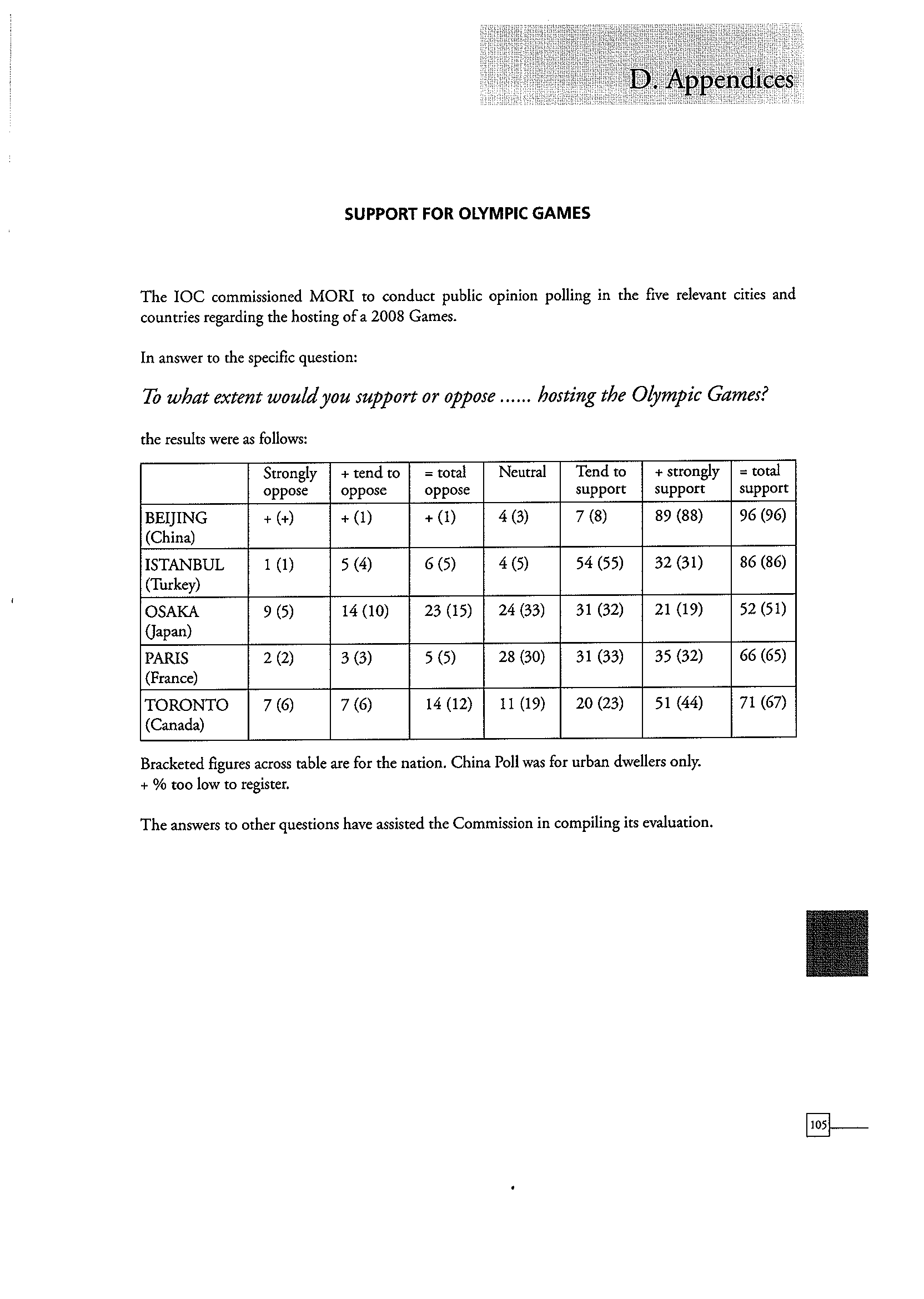Introduction
The topic “What are the impacts of the Beijing Olympics games on the Chinese tourism industry?” analyzes the impact of this event towards Beijing city. This paper studies the various impacts that have been created while Beijing holds this event as well as after this event. This event will be taking place from August 8, 2008 till the 24th of August 2008 in Beijing National Stadium, Beijing, China.
This paper first introduces the Olympic games which will be held in Beijing in 2008. In this part, we briefly introduce the Olympic games and refer to its past history from the time it begun until the most recent times. We will then look at Beijing’s history and its famous attractions before the Beijing games were assigned to be in Beijing.
This will then be followed by the introduction of the research question which is what are the impacts of the Beijing Olympic games on Chinese tourism along some of the possible answers to it. This will include points like the development of infrastructure in a massive pace, the increase of job opportunities in Beijing and the areas around it, the ability to generate more income thru the huge amounts of tourists coming in China as well as maintaining and expanding the Chinese economy. In discussing the development of infrastructure, we talk about all the most current developments in China from massive building constructions to transportation infrastructures.
This is followed by the job opportunities subject whereby we highlight the current employment rate and compare it to past times. Apart from that, we also discuss on the impact of tourism in China. Here, we talk about the number of expected tourists in China for the games and how is China preparing for it. Finally, we study all the above impacts towards the economic stability of China.
In order to complete this paper, literature review was done to collect information for the first part and the second part of the report. The information gathered helped in understanding the topic better and was also used in including various definitions needed for the 1st part of the report. The literature review was done through many books, journal articles and articles on online webs. This method allowed the formation of research questions and research objectives vital for the completion of the report. Apart from that, an interview method was conducted to answer my research questions which were all more subjective in the form of open-ended questions. The questions were formed using the literature review as a guide to determine appropriate questions. A total of 10 questions were formed in the investigative form based on the research questions and research objectives. The Interview sheet were designed as below:
History of the Olympic Games & Beijing
Olympic games begun in the early 10th century as a religious activity in their temple which was for Zeus, their “God” in a place called Olympia. They used to hold games to in this stadium as part of their religious activity. The stadium could hold up to 40,000 spectators. By the time the 4th century came along, the Olympic Games was a not to be missed event. The Olympic games was a symbol of purity and importance to the religion. Zeus was considered the most important Gods in the Olympic games. Among some of the games that were played were running, jumping, discus throw, wrestling, boxing, pankration as well as Equestrian events. The Olympic rings represent the five parts of the world.
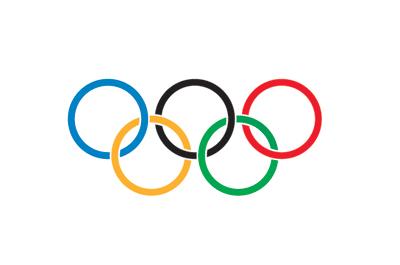
The Olympic rings
“These five rings — blue, yellow, black, green and red — represent the five parts of the world now encompassed by Olympism and ready to compete against each other. Moreover, the six colours (including the white background) thus combined represent those of all nations, without exception. The blue and yellow of Sweden, the blue and white of Greece, the French, English, American, German, Belgian, Italian and Hungarian tricolours, the yellow and red of Spain are side by side with the new Brazilian and Australian flags, the old Japan and the new China. It is a true international emblem.” (As quoted from Coubertin; selected writings II, p. 460, 1913)
In 1914, Coubertin designed the above Olympic flag for the 20th anniversary of the Olympic games in Paris. In 1995, a research conducted by the SRI or the Sponsorship Research International showed that one of the most recognizable symbol is the Olympics symbol as compared to Mcdonalds or Mercedez Benz.
As centuries followed, the tradition is still being carried on from one country to another. For this year’s Olympics, it will be held in a city called Beijing, in China. The symbol for Beijing will be represented by “Dancing Beijing”, depicting a Chinese seal inscribed with the character “Jīng” (from the name of the host city) in the form of a dancing figure as shown below:
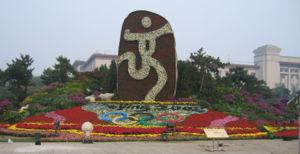
“The Dancing Beijing”
Beijing is one of the most historical place in China. The city was the capital city for the State of Yan before the 10th century. Later, it was ruled by the Lioa and Jin dynasties. Beijing city was previously known as Youzhou. After the above dynasties, the Ming and Qing dynasties also ruled Beijing in the 1400hundreds. The historians believe that Beijing was one of the biggest cities in the world around the year 1425-1650’s and also from 1710-1825. During this time, the famous Forbidden City was constructed. Another famous sight is the Tiananmen Square whereby on one side of the square lies the People’s History Museum and on the other, the Great Hall of the People.
In 1949 however, the Communist forces entered China without any hassle and ruled China, which was then known as the People’s Republic of China shortly after. Following many constructions in the city, the urban areas expanded vastly. The city was soon famous as a shopping district as well a major electronics center for China. However, there were also a lot of political mayhem taking place in the city.
Till this day, The Great Hall is used for major meetings of the government and State occasions. There are also elaborate receptions held for foreign dignitaries and it contains over 50 rooms, each dedicated to a particular province or minority. The square has red walls, golden roof tiles, and the portrait of Mao Zedong contrast strongly with the surroundings of grey and buff. Thousands of tourists from all over China visit the Forbidden City daily.
Some of the sights not to be missed in Beijing are:
Tiananmen Square
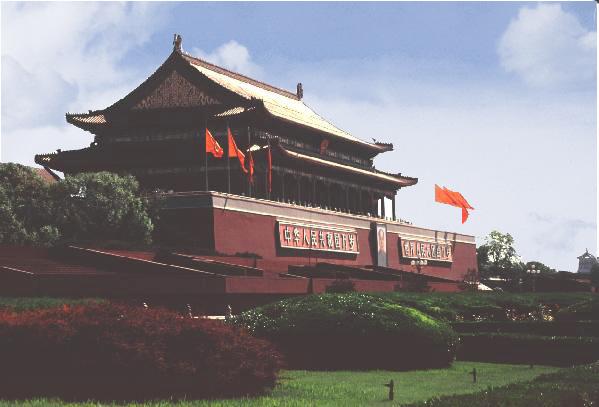
The temple of heaven- Tiantan Park
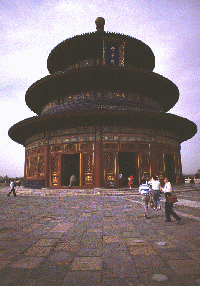
The Summer Palace
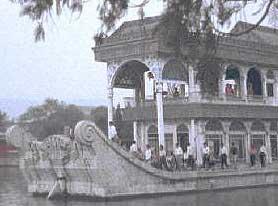
In present times, Beijing has most of the historical sites to be seen, as some listed above. However, Beijing has had some issues in urbanization, heavy traffic problems, poor air quality, the loss of historic neighborhoods and significant influx of migrants from around China to fill up the many job vacancies produced by the city’s vast development.
Past Olympic Games Summary
Looking back at the past Olympic games held in Los Angeles (1984), Sydney (2000) and Athens (2004), there is much for Beijing to learn from the past experience.
There were reports in 1976 Summer Olympics in Canada that massive financial losses were reported. As a result, few cities wished to host the Olympics and this was seen as a major threat to the future of the Olympic Games. In 1984, Los Angeles Olympics Chief Executive Officer Peter Ueberroth and Chief Operating Officer Harry Usher, reported that they were able to produce a profit of over $200 million as organizers of the games. As quoted, “the 1984 Games were the second to make a profit, after only the 1932 Summer Olympics (also in Los Angeles).” As a result, with the financially successful Los Angeles Games, cities began to compete to take up being the hosts for the games again.
One of the negative reports of the 1984 Games, was that it had many of the United States cycling team using the “blood boosting” procedures otherwise known as drugs, which was not illegal at the time but made illegal shortly afterwards due to the negative effects of it later on.
One of the things that Beijing would be able to learn from is between the Los Angeles and Montreal Games. The above are seen as examples of what to do and what not to do when hosting the Olympics and serves as lessons to prospective host cities. Montreal organizers ran up a substantial debt eight years earlier by constructing many new, overly ambitiously designed venues while the Los Angeles Olympic Organizing Committee relied heavily on the use of area venues that were already in existence.
Subsequently, low construction costs, coupled with a private corporate sponsorship, allowed the Games to generate a profit of more than $200 million, making them by far the most financially successful in history.
Also, referring to the previous Games such as in Atlanta (1996) and Athens (2004) which are the need to avoid excessive commercialization and the need to organize and build to schedule.
As quoted, in 2002, “the Auditor-General of New South Wales reported that the Sydney Games cost $AUD6.6 billion (£2.3 thousand million), with a net cost to the public between $AUS 1.7 and 2.4 billion (between £580 million and £830 million).”
As quoted, a “multiplier” effect on broader economic development is not realized as a simple “multiplier” analysis fails to capture is that resources have to be redirected from elsewhere: the building of a stadium is at the expense of other public works such as extensions to hospitals. Building sporting venues does not add to the aggregate stock of productive capital in the years following the Games: “Equestrian centres, softball compounds and man-made rapids are not particularly useful beyond their immediate function.”
As quoted, on November 13 2004, the Greek embassy estimated the costs of hosting the Olympics at 8.954 billion Euros (about $11.2 billion in 2004) not including construction made regardless of the Games, but including 1.08 billion Euros ($1.35 billion) in security costs.
Due to terrorism attacks, following the September 11, 2001 attacks, concerns were much higher. Greece had to increase the security budget to €970 million (US$1.2 billion). It Is reported that approximately 70,000 police officers patrolled Athens and the Olympic venues during the Olympics. The government also asked additional support from NATO and the European Union who provided minor support.
Furthermore, Greek hotel staffs, paramedics and ambulance drivers had staged a series of one-day strikes over wage disputes before the games as they had been asking for a significant raise for the period covering the event being staged.
As a conclusion, the Beijing Olympic games could learn from the above mistakes and improve on theirs this year. First of all is involving cost. The Beijing government should be cautious on their spending and ensure that the additional venues built could be used for later. Apart from that, the employees working for the Games should be paid accordingly to avoid sudden strikes. Also, security measures should be strictly taken to be prepared against terrorism attacks.
Olympic games Beijing
The 2008 Summer Olympics officially known as the Games of the XXIX Olympiad, will be celebrated from August 8, 2008, to August 24, 2008, with the opening ceremony commencing at 08:08:08 pm at the Beijing National Stadium in Beijing, People’s Republic of China. The Olympic games this year is held in Beijing after much competition with other cities around the world such as from Moscow, beating Toronto, Paris, Istanbul, and Osaka.
Beijing was elected the host city on July 13, 2001, during the 112th IOC Session. Prior to the session, five other cities—Bangkok, Cairo, Havana, Kuala Lumpur, and Seville—submitted bids to the IOC but failed to make the shortlist in 2000. The voting distributions were quite close for the bidders. After the first round of voting, Beijing held the majority of the votes which gave it a significant lead over the other four candidates. As a result, Osaka received only six votes and was eliminated in the first round.
However, in the second round, the majority of voters supported Beijing almost unanimously, which eventually eliminated the need for subsequent rounds. Thus, most of the voters were quite unanimous in wanting to give Beijing a chance to host the Olympic games and prove itself to the rest of the world.
Previously, Beijing had bid to host the 2000 Summer Olympics. Unfortunately, after several rounds Beijing which had led the voting over the first three rounds, lost to Sydney in the final round in the year 1993. The government then studied the result of why the voters had decided in such a way and improved on it which is one of the reasons why they won these time. Hosting the Olympic games is something that is huge for a city especially like Beijing which has a rich history of being run by various dynasties and with a mixture of different influences. This provides a huge opportunity for the city to show what it has to offer to the rest of the world.
There is no better way to market a country’s tourism and boost it to the fullest than the Olympics event. This event brings together 32 countries and thousands of people to one place to celebrate sport. This is also a live telecasted event to many of the satellite cables across the globe. Thus, it’s a huge opportunity for China to prepare itself to open up its country to the rest of the world.
Below is the attached document of China’s winning over the other competing cities from around the world.
The Olympic games were awarded to Beijing, People’s Republic of China after an exhaustive ballot of the International Olympic Committee (IOC) on July 13, 2001. The official logo of the games, titled “Dancing Beijing,” features a stylized calligraphic character jīng ( meaning capital), referencing the host city. The mascots of Beijing 2008 are the five Fuwa, each representing one color of the Olympic rings. The Olympic slogan, One World, One Dream, calls upon the world to unite in the Olympic spirit. Athletes will compete in 302 events in 28 sports, just one event more than was on the schedule of the Athens games of 2004. Several new National Olympic Committees (NOCs) have also been recognized by the IOC.
The Chinese government has promoted the games to highlight China’s emergence on the world stage amidst concerns about environmental issues and gross human rights violations, particularly in Tibet. Nevertheless, former IOC president Juan Antonio Samaranch has said the Beijing games will be “the best in Olympic history.
The tourism industry
The tourism industry is just growing in China. Previously, the tourism industry in China was slow moving due to negative perceptions of China such as low air quality, controlled fully by a Communist party and so on. The poverty level in China was also high. Apart from that, the unemployment rate was high in the past few years. This also resulted in a negative effect towards the Chinese tourism as many felt unsafe visiting China. Its government did not take much effort to promote its country either as they had a more of a closed concept towards allowing foreigners to their country.
However this changed as recently as last year, 2007. The number of tourists in China drastically rose up to 131million as compared to 124 million tourists in the year 2006. Although it was mostly based on inbound tourism, whereby most of the tourists were China citizens themselves. Out of this figure, an estimated 26million of them were foreign tourists from various parts of the world. 16million of the above figure were from Asian neighboring countries such as Thailand, Cambodia, Malaysia and so on. Apart from that, an estimated 2.7 million tourist out of 26million foreign tourists were from America, 6million from European countries and the rest were from Africa and so on.
The totals of domestic travelers or inbound tourists in China contribute around 1.6 billion with an average expenditure of 482 yuan RMB per person, approximately USD66 per person. This includes their expenditure on room accommodation in hotels, restaurants, theme parks or parks as well as tourist gifts or local handicrafts.
Previous researchers done showed that there are approximately 13 thousand travel agencies registered in whole of China. Out of this figure, around 1,400 of them are international travel agencies that try to promote China overseas and bring in foreign tourists. Apart from that, nearly 12 thousand of these agencies are focused on domestic travel from the various different parts of China. As we can see, from the number of travel agencies, this as a result encourages more local tourists to come to China as their international agents are very few as there perhaps aren’t that much demand as compared to their local people.
Also, there are currently about 12 travel agencies which has ties with foreigners and run on foreign investment as of a result done by a research at the year end 2003.
The number of hotels are roughly around 10, 481 hotels around China as of last year compared to an estimated 7 thousand over hotels by the year end 2006. Research also showed in 1995 that there were only an estimated 3, 700 hotels that offered accommodation to foreign tourists mainly Asian tourists.
Apart from that, the total number of employees in the hospitality and the tourism industry has been identified at an estimated 5.98 million as of the year end 2001.
Experts in the hospitality and tourism industry have also summed up the total income from the tourism sector in China in 2006 amounted to an estimated figure of 85.3 billion Euros.
Impact of the games on Beijing
Infrastructure
Hosting the Olympic Games will help to change the image of China in the eyes of the rest of the world as quoted by Professor Jin Yuanpu which will be visible mainly thru its infrastructure development. As quoted by the experts, in a report to the National Congress of the Chinese Communist Party, the Beijing Olympic Organizing Committee stated that the preparations for the 29th Olympic Games are proceeding as planned in various ways including the infrastructure development. Apart from that, the Chinese government had to build 37 new venues and out of the 37 new competition venues to be built, 27 have already been completed. This is a major achievement which has received praises from the IOC and other international athletic organizations.
By developing the infrastructure in Beijing and areas around Beijing, it has increased investments received. Many foreign property managements bid to open up various buildings and accommodations to prepare for the Olympic Games. Apart from that, as a measure to prepare the economy for the Olympics, the Chinese authorities and public sectors have challenged themselves to improve infrastructure and transportation links, as these measures will have some positive effect in increasing the productive capacity.
As quoted by Professor Jin, many cities who have hosted any Games would have to undergo a period of recession. This is due to the out flow of the money as most athletes and spectators who would have come for the Games would be leaving the country or the Beijing city. From the thousands that crowded the city, it will suddenly be emptier as time goes. This will definitely give a major impact to the hotels surrounding the Games area as well as the other businesses in that area. This is known as a post games effect.
However, referring to Beijing city, this effect will not have such a major impact on the city due to its huge population and size as reported by some research done recently. Apart from that, most of the infrastructures built would be re-used in many other ways and would benefit the locals. Besides that, the size of the city was one of the most carefully considered factors right from the determining round for the hosting bid, when the Olympic venues were being planned.
Furthermore, the Olympics Games has given Beijing a good reason to upgrade and increase the number of its sports facilities, which were already becoming insufficient taking into consideration the city’s growth rate. For example, the newly built Beijing National Stadium, which is also known as the Bird’s Nest, has already been booked in advance for two years after the Olympics.
Public Transportation & Communication Improved
Beijing city has done a lot of work in enhancing its transportation system as its quite a vital part of accepting the thousands of people in Beijing and allowing them to be mobile. The system has to be efficient in terms of keeping up with time and speed as well as in between the budget.
Below is a map illustrating all of the Olympic venues in Beijing.

Olympic venues in Beijing

Various expressways to the center of the city
The government has also ensured that there are many ways for the athletes as well as for the tourists to travel around Beijing. Most of these transportation systems encircle to the center of the city, where most of the main venues for the games are. Their aim is to provide fast and efficient transportation around the city and between venues.
Anticipating nearly three million people or more during the games, the government is currently working on expanding the subway systems. As a result, Beijing’s subway system is currently going through a major extension to more than twice its existing size to ensure that it will withheld the double capacity.
As per sources, the subway system is currently composed of four main lines and 64 stations. Thru the expansion programme, there will be an additional seven lines which will add around more than eighty new stations, which are being constructed. This includes a direct link to Beijing Capital International Airport. This is mainly to give comfort and easiness to foreigners who can right away go from the airport to their hotels or to visit the main venues.
As for in the Beijing Capital International Airport, there will be, eleven unmanned trains, whereby each of these trains could transport up to a maximum of 83 passengers at one time. It will also accelerate the movement of people throughout the new terminal building. According to sources, most of them are planned to start functioning from June 30, 2008 which is roughly one month before the beginning of the games.
Last year, in January 2007, the government had declared that the Metro cars especially those in Beijing will have built-in mini video screens to showcase the latest news and updates of events during the games.
Apart from that, cell phone signals would be made more accessible in harder to reach places as to enable people to use their communication devices, such as in the metro stations which are located mostly in the underground tunnels. The service providers will also collaborate with the government to ensure that their services will include some updates on the Games as well as provide efficient lines everywhere for the convenience of its people.
Besides that, as quoted according to the General Administration of Civil Aviation of China, there will be an emergency alert system with the capability to assess up to five-levels of emergency situations especially for extreme weather and security threats. This will be implemented in the Beijing International airport. This security system is designed to make sure that the transportation system runs smoothly safely for the estimated three million domestic and overseas visitors who will gather in Beijing for the games in August 2008.
Additionally, on land, Beijing is set to assign thirty-eight official public transit routes that will link the Olympic venues. As quoted, “During the games, 2,500 large-size buses and 4,500 minibuses will be operated by a total of 8,000 drivers to transport people across various venues”. Moreover, proceeding to the games in August, public transportation will be optimized as to reduce the existing 110 overlapping routes.
The government has also ensured that smoking is banned in the estimated 66,000 cabs to curb the bad air levels currently being experienced in Beijing. Furthermore, any violation against the above rule could lead to a fine of 100 to 200 yuan (13 to 26 USD). This fine will be applicable to both the taxi driver as well as the passenger in the car. Beijing authorities are therefore trying to make the event a non-smoking event.
Politically
According to some reports of the games, the Beijing Olympics are a cause for nationalistic rejoicing and a political turmoil. It will be a proud time for the Chinese athletes to demonstrate their proud abilities to the world as its led by one of Asia’s strongest countries. There are some political analysts claims that although the games will be efficiently handled and impress the world media and the international athletes, there will be constant political battles fought quietly inside the government.
It claims that most of the authorities would be relieved once the Games are over although such a huge event would give China a chance to expose itself globally and refresh its image to the rest of the world. As quoted, “such an event will provide a showcase for China, but will also expose its weaknesses.”
First and fore mostly, although there has been an immediate economic progress, it has not been accompanied by commensurate political liberalization. Inside sources claims that the Communist Party retains its monopoly of power and the government and harshly treats those who challenge it. As compared to the year 1964 when Japan fully pledged itself as a democratic country and also South Korea also moved in that direction in 1988, its quite embarrassing for China to maintain its monopolization of power and the government as most would expect them to change to democratic leadership as well.
Thus, when thousands of journalists descend on Beijing in Augus, such irregular development in politics could prove an embarrassment to China and its government. Although the journalists’ main job will of course be to cover the athletics and the Games but their presence will be quite a rebellious act once they discover what is happening in the political scene.
The Chinese Communist Party who has lost its ideological edge, relies on patriotism and persistent high growth to maintain its legitimacy; as quoted. These two were satisfied when the reversion of Hong Kong to the mainland in 1997 and the winning in 2001 of the right to stage this year’s Games as sources quoted.
Economy
One of the main significance of the games is its higher economic growth to the country. Due to the increase in spending as there will be nearly 3million people in Beijing related to the Olympics will help to boost the Aggregate Demand (AD) and the country’s economic growth.
However, the increased in spending will only represent a relatively small percentage of GDP whereby some estimates suggest around 0.5% of GDP. Apart from that the Chinese economy is already growing very quickly so it is quite debatable whether a further boost as a result of the Games will help.
The games could also lead to a high level of inflation. The Olympics will certainly create some restricted inflation. The extra spending could help increase inflation, which is already a crisis in the Chinese economy.
Furthermore, the exchange rate could also be affected by the Games. The influx of nearly 3million tourists could put more rising pressure on the Chinese Yuan. The government has been trying to hold the exchange rate down or maintain it low, but the influx of foreign visitors especially from countries outside Asia will only cause further increases in demand and push it higher.
There could be a multiplier effect though and the initial increase in AD could be magnified.
From a macro economic point of view it is not clear how important the Olympics will be. There is a definite increase in AD, but, it remains a relatively small % of total GDP. Similarly, the investment improvements could lead to future economic growth.
Generating employment opportunities
As the games approach China, the employment opportunities in China is growing massively and people are flying in from all over the world to meet this employment demand in China.
Next year, China will become the first developing country ever to organize the Olympic Games. Professor Jin, a Chinese political expert feels that by hosting the Games, China will be able to set a positive example for other developing countries who would like to eventually take on the same task. The Beijing Olympics is at the moment employing over 130 million people for the event. This spreads out to the hotel industry, tour agents as well the foreigners who are participating in the event.
As per reported, the first phase of ticket sales is also successfully behind at an approximate figure of over a thousand tickets and a total of over 6,700 volunteers have been recruited to give athletes and Olympic tourists a hand during the Games. This includes the little things to enhance people’s experience during the Games with the hope that they will return after the Games and boost the tourism industry.
Tourism industry blossoms
The current Olympic games have an obvious result of boosting the tourism industry in China. This is a short term effect but will help increase spending in the economy with the local as well as foreign currency in Beijing. It will come from the athletes, spectators and media who will travel to Beijing. It is controversial topic on whether or not the Olympics will also provide a long term boost in repeat tourism in China as this could be quite significant for China as the tourism industry is largely underdeveloped.
The hotels in China are undergoing a shortage as the demand is beyond what they expected. As quoted, “ The number of hotels are roughly around 10, 481 hotels around China as of last year compared to an estimated 7 thousand over hotels by the year end 2006. Research also showed in 1995 that there were only an estimated 3, 700 hotels that offered accommodation to foreign tourists mainly Asian tourists. “
Apart from that, it is also reported that Mr Wilber, a consultant to the United States Olympic Committee, is urging American athletes, to arrive in Beijing at the last possible moment and to wear masks over their noses and mouths once they are there as a protection against smog. The above advice could cost a lot to Beijing’s tourism industry.
Problems experienced by Beijing hotels
Based on the interview conducted with various hotel managers in the Beijing area, the hotels in Beijing are experiencing various problems. One of it is adapting to the sudden change in the service styles and incorporating western aspects to it. For example, hotels have begun to add various westernized meals in their menus and invite various English playing bands to play in their hotels specially to attract the foreign crowd. Also, they are finding it a little hard to find sufficient staff especially chefs to handle the Western cuisine as many of them feels that the compensation is not enough.
However, most hotels in Beijing are having the added exchange counter incorporated in their reception areas to facilitate the foreign tourists to change their money. Although, most of them are sticking to the same currency exchange rates as competition is picking up.
One of the biggest challenges that hotels are facing is to bring in more English speaking employees as most of the native people speak fluently in the many Chinese dialects. It is also expensive for the hotels to bring in foreigners who speak English as the salary expectations will definitely be higher and the hotel would have to provide accommodation and others. The hotel is managing this by encouraging their local staffs to learn English language. Some hotels are even providing English courses since last year to enable their staff to pick up the language before the event this August.
Besides that, the hotels are also providing shuttle buses to the Olympic stadiums and also to the nearby tourists attractions. The hotel makes money by sending their local employees as tourists guides to give their guests short tours around the tourists attractions. Tourists tend to prefer taking this service provided by the hotel as they feel its much more safer and faster and they don’t mind paying for it.
The hotels are also aware regarding the negative air pollution problem in China and its negative effect on tourists perception. Thus, the hotels are taking various measures to ensure that the tourists feel safe and clean. Thus, they have allocated several areas as a smoking zone and the rest of the hotel is smoke-free zone. They are even doing this for the restaurants. They have allocated a room, specifically to cater for smokers in the restaurant area and the rest of it is a smoke-free zone. This is widely being used in hotels around Beijing.
Moreover, most of the Beijing hotels have increased their room rates to almost 7 times their normal prices to increase their room revenue. Amazingly, most of the customers do not mind the increase due to the exchange rate. It is approximately at the rate of USD 1 to CNY6.9. It is almost 7times the amount, thus its not really that expensive to the foreign tourists.
Furthermore, safety issue is a major issue in any event. Thus, these hotels have taken various measures to ensure that this is under control. They have employed various security personnel’s as to ensure that the guests feel safe in their area. Apart from that, the hotel has taken additional measures of training their hotels employees for safety training.
These training includes fire training, emergency exit training and others. The hotels have elected a specific group of staff as Emergency handlers and they have been trained specifically to handle emergency issues. They will be on duty 24hours and are on constant alert incase of any emergency.
Apart from the above, many hotels are cooperating with each other to handle overcrowded situations. Incase of an overcrowded situation, hotels would have to farm their guests to another hotel. Thus, hotels that are located in the same area are taking measures to try to corporate the overcrowding issue during the games.
Hypothesis
Based on the interview done with the Hotel Manager from several hotels in the Beijing area, the following hypotheses were concluded:
- There are insufficient hotels to cope with the demand even though many new hotels were built
- Language is a barrier among the locals and the foreigners
- New services added does not help to overcome air pollution issues in the area
From the interview conducted with selected Managers from the hotels in Beijing, the above 3points were concluded. The first point, insufficient hotels has been proven by statistics that the amount estimated and the actual amount has a big variance. Thus, this has created an overcrowded situation. However, how is this possible? Some researchers say that this is due to the sudden influx of Asian tourists as many of them have not got a chance to see World Olympics that so far had been held in countries across Europe, thus its one experience to be treasured.
The second hypothesis suggests that language is a barrier among the locals and the foreigners. Most of the employees and employers are of Chinese native and have just begun to accept foreigners into their country, thus the use of English is still very much little and had just begun. It has proved to be quite a challenge for the locals to cope up with providing customer service to the European and American tourists. The government has handled this problem well by bringing in various English speaking translators to assist this situation.
The third hypothesis suggests that although various new services such as added transportations and communication modes have been added to facilitate the event, the air pollution problem has not been resolved. The government is trying hard to assure tourists and athletes that it is safe to visit Beijing, however the negative media towards the air pollution is not helping.
Conclusion
It really comes down to how China manages to host this important global event, it will shape the world’s perception of China. There will surely be a shift of perception for most people after China hosts the Olympic Games this year. The important question is whether this will be a positive or a negative perception? This could be the potential tourists, investors and so on.
This is the time for China to change its communism image to the rest of the world as the world is watching. Hosting the Olympic Games could be a way for China to change its image as an inviting country to the eyes of the rest of the world. The local media has reported that for the games, the Chinese government has given permission to the media and also its deciding to allow foreign media to report freely from the country which is something that has never or rarely happened before.
Apart from that, the government has also decided to let the media regardless whether it’s the local or foreign media to interview whoever they like provided that they first take the initiative to ask for the interviewees’ approval.
As quoted, “Professor Jin Yuanpu believes that the Olympics games will help the world adopt a more positive view of China”. Professor Jin believes this can be changed when the country host the games. The government is really trying hard to change the world’s perception of China. The government wants to get rid of its negative outlook and is ready to get a fresh start and as a result have started being more open. Beijing has been presented in a more positive light in the media compared to a couple of years ago especially since a decade ago.
Professor Yuanpu as quoted says that studies have been conducted on the consequences of organizing the Olympics. This is also the purpose of the ”Post-Olympic Games in Beijing” project. This should churn out on whether or not the Games would be good or bad and the proof.
Generally, researchers report that every city undergoes a period of recession after hosting the Games as quoted by Professor Jin. However, Chinese experts say that this effect will not have a significant impact on Beijing due to its huge population and size. The IOC decision was based on one of the things, the size of the city. This was one of the most carefully considered factors right from the get-go, when the Olympic venues were being planned.
Moreover, the Olympics gave Beijing a good reason to upgrade its sports facilities, which were already becoming insufficient considering the city’s growth rate as reported by the local reporters.
For example, the new National Stadium, which is also known as the Bird’s Nest, has already been booked solid for two years after the Olympics by various corporate clients and other government bodies for international and national events from around the world. Thus, there is nothing to address the regional inequality in China as mentioned by Professor Jin. It is reported that the North of China requires much more growth and upgrade then its South such as Beijing.
The Games may also result in an inflation situation in the country for the next few months after the Games at least. But this may not happen as the population size may cause the demand to increase, thus maintaining the price at a low rate. Apart from that, the government should make a lot of money with the Games as the return of its investments seems to be quite a lot with the influx of foreign tourists.
Bibliography
- Beijing Olympics Committee, “Beijing Olympics 2008 Official Website “. Web.
- Beijing Olympics Committee, “Hotels in Beijing required to comply with environmental standards”. Web.
- Beijing Olympics Committee, “Hotels in Beijing required to comply with environmental standards”. Web.
- Beijing Olympics Committee, “Beijing checks hotels, restaurants for food safety”. Web.
- Beijing Olympics Committee, “Olympic Venue Distribution”. Web.
- Beijing Olympics Committee, “Beijing airport to launch emergency alert mechanism for Olympics” . Web.
- Beijing Olympics Committee, “38 public transit routes to the Olympic venues “. Web.
- Beijing Olympics Committee “Beijing 2008 tickets go on sale “. Web.
- Beijing Olympics Committee “The Official Mascots of the Beijing 2008 Olympic Games “. Web.
- Beijing Olympics Committee “About 600 athletes to compete for the U.S. at 2008 Olympic Games “. Web.
- Beijing Olympics Committee “Promise of clean air during Olympics”. Web.
- Beijing Olympics Committee “USOC official: air quality not a concern for U.S. Olympic delegation in Beijing”. Web.
- Beijing Olympics Committee “Weather drills get under way for 2008 Olympics “. Web.
- Beijing Olympics Committee “Beijing to keep skies clear on Games’ opening day “. Web.
- Beijing Olympics Committee “Weather drills get under way for 2008 Olympics” “. Web.
- Beijing Olympics Committee “USOC official: air quality not a concern for U.S. Olympic delegation in Beijing”. Web.
- Lu, An (2008) “Estonian official: Beijing Olympics will boost China’s development”. Web.
- People’s Daily Online, “Beijing Embraces 2008 Olympics”. Web.
- IOC (2008) “Beijing 2008 Games of the XXIX Olympiad”. Web.
- BBC Sport (2007) “Pollution Risk for Olympic Events”. Web.
- China Daily (2007) “Don’t politicize Olympics, official says”. Web.
- 2008 Summer Olympics. Web.
- Schiller, B (2007) “China’s Coming Out to Party”. Web.
- International Olympic Committee, “Report of the IOC Evaluation Commission for the Games of the XXIX Olympiad in 2008”. Web.
- BBC News (2006) “Beijing stamps out poor English”. Web.
- China Reuters (2007) “Chinese Architect Slams Olympic ‘Pretend Smile’”. Web.
- Gulf Times (2006) “China to sell over 7million tickets”. Web.
- Lei Lei (2007) “Official Olympics gear now just a click away”. Web.
- Morris, Chris (2006) “Video games push for Olympic recognition”. Web.
- Olympic Committee (2008) “BOCOG Announces Olympic torch relay route”. Web.
- The Hindhu (2007) “China to build highway on Mt Everest for 2008 Olympics”. Web.
- The Associated Press (2008) “China closes its side of Everest to climbers”. Web.
- Beijing Olympics Committee (2008) “Olympic Flames begin relay in Greece”. Web.
- BBC News (2008) “Confusion strikes US Torch relay”. Web.
- O’Connor & Bremner (2008) “Paris cancels Olympic flame ceremony casting doubt over London’s 2012 torch tour” . Web.
- BBC News (2008) “Regions and territories : Netherlands Antilles”. Web.
- BBC News (2005) Korea ‘to unify Olympic teams’. Web.
- Ward, Margaret (2008) “China to mark its territory with Olympics 2008”. Web.
- An, Lu (2008) “Malaysia’s TV Operator to add more channels for Beijing Olympics”. Web.
- Knowles, Bryan (2001) “Are the IOC and NBC unfairly prohibiting internet coverage of the Sydney Olympics?”. Web.
- Luebbers, Mat (2008) “2008 Beijing Olympic Swimming Finals in the morning looks to be a reality”. Web.
- Macartney, Jane (2005) “Thousands of homes destroyed to make way for Olympic tourists”. Web.
- Fan, Maureen (2008) “China defends relocation policy”. Web.
- Amnesty International (2008) “People’s Republic of China The Olympics Countdown – Crackdown on activists threatens Olympics legacy”. Web.
- Amnesty International (2008) “What Human Rights Legacy for the Beijing Olympics?”. Web.
- Hutzler, Charles (2007) “China Sees Activists as Olympic Threat”. Web.
- BBC News (2008) “Spielberg in Darfur snub to China”. Web.
- CNN News (2008) “UN Chief to skip Beijing ceremony”. Web.
- Demick, Barbara (2008) “Olympians air a gripe about Beijing”. Web.
- BBC News (2007) “WHO fears over Beijing pollution” . Web.
- Cui, Xiaohuo (2007) “New water treatment system for Olympics”. Web.
- CNN News (2008) “China hurt over US food plan for Games”. Web.
- Shpigel, Ben (2008) “Wary US Olympians will bring food to China”.
- Wallace, Bruce (2008) “A Japanese craftsman’s one-man Olympic boycott”. Web.
- Demick, Barbara (2008) “Olympians air a gripe about Beijing”. Web.
- Shai, Oster (2007) “Will Beijing’s Air Cast Pall Over Olympics?”. Web.
- Ramzy, Austin (2008) “Beijing’s Olympic War on Smog”. Web.
- Ramzy, Austin (2008) “One Year To Go”. Web.
- Beech, Hannah (2007) “The Mountain is High, and Beijing is Far Away”. Web.
- Bresnahan, John (2007) “Waters Wants to boycott Beijing Olympics”. Web.
Appendix
Interview Sheet
- Q1. What market does your hotel specifically cater to and what are the facilities that the hotel provides to these markets before the Olympics?
- Q2. What are the preparations that the hotel will do to cope with the foreign tourists?
- Q3. What is management’s biggest challenge to manage the hotel? How is this problem managed?
- Q4. What are the strategies that the management has developed for overcrowded situations in Beijing hotels?
- Q5. Would this hotel be smoke free? Or will the hotel provide a particular smoke area?
- Q6. Have the managers and staff of hotel received safety related training for the Olympic Games?
- Q7. How is the safety issue managed in the hotel?
- Q8. How does the hotel price the rooms for Olympic Games period? Has the price been increased?
- Q9. Is language a barrier in Beijing? How do the management overcome this problem with the native staffs?
- Q10. Has the room rates been increased to increase room revenue?
- Q11. What is the plan for the hotel after the Olympic Games?
- Q12. Overall, has the Olympic games given a positive/negative impact to the hotel?
Support for Olympic Games
